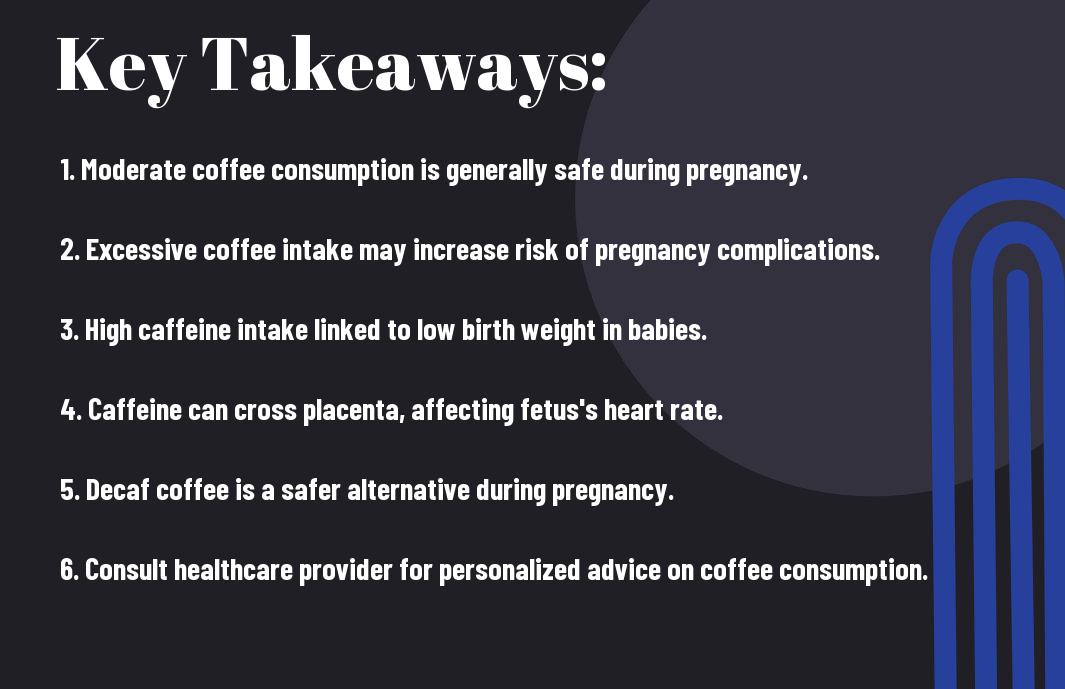Most expectant mothers wonder about the impact of caffeine consumption on their pregnancy. Understanding how coffee affects pregnancy is crucial for making informed decisions during this crucial time. Here, we probe into the effects of coffee on pregnancy to provide you with the necessary information to navigate this aspect of your prenatal journey.

Key Takeaways:
- Caffeine consumption should be limited during pregnancy: Excessive intake of caffeine through coffee and other sources can increase the risk of miscarriage and low birth weight.
- Decaf coffee is a safer alternative: Pregnant women can opt for decaffeinated coffee to satisfy their cravings while reducing the intake of caffeine.
- Consult with a healthcare provider: It is important for pregnant women to discuss their coffee consumption with their healthcare provider to ensure they are following safe guidelines for caffeine intake during pregnancy.
The Effects of Caffeine on Fetal Development
Caffeine’s Impact on Fetal Growth
A developing fetus is especially vulnerable to the effects of caffeine due to its limited ability to metabolize the substance. High levels of caffeine in the mother’s bloodstream can easily cross the placenta, exposing the fetus to this stimulant. Research suggests that excessive consumption of caffeine during pregnancy may lead to restricted fetal growth, potentially increasing the risk of low birth weight and other complications.
The Role of Caffeine in Birth Weight and Length
Studies have shown a potential link between maternal caffeine intake and alterations in birth weight and length of the newborn. High levels of caffeine consumption have been associated with a higher likelihood of delivering a baby with reduced birth weight. This can have implications for the infant’s overall health and development in the long term.
With the impact of caffeine on fetal development in mind, it is crucial for expectant mothers to be mindful of their caffeine consumption during pregnancy. Consulting with a healthcare provider about safe levels of caffeine intake can help mitigate potential risks and ensure the well-being of both the mother and the developing fetus.
Coffee Consumption and Miscarriage Risk
Even with the joy that pregnancy brings, it’s crucial for expectant mothers to be mindful of their coffee consumption. Several studies have explored the potential link between coffee intake and the risk of miscarriage. While the results are not conclusive, it’s crucial to understand the potential impact of caffeine during pregnancy.
The Link Between Caffeine and Miscarriage
Any amount of caffeine consumed during pregnancy can cross the placenta and reach the developing fetus. This can affect the baby’s heart rate and metabolism, potentially increasing the risk of miscarriage. While some studies suggest a higher risk of miscarriage with increased caffeine intake, others have found conflicting results. It’s important for pregnant women to discuss their coffee consumption with their healthcare provider to determine what is safest for their individual situation.
How Much Coffee is Too Much?
On the side of caution, many healthcare providers recommend limiting caffeine intake during pregnancy to 200-300 milligrams per day, which is roughly equivalent to one 12-ounce cup of coffee. It’s important to consider other sources of caffeine in your diet, such as tea, soft drinks, and chocolate, to ensure you stay within the recommended limits.
Much like with any dietary choice during pregnancy, moderation and open communication with your healthcare provider are key when it comes to coffee consumption. By being informed and making the best choices for you and your baby, you can enjoy your coffee while prioritizing the health of your pregnancy.
Caffeine and Fetal Heart Rate
The Effects of Caffeine on Fetal Heart Rate
Despite the popularity of coffee among many pregnant women, it’s imperative to be aware of the potential impact of caffeine on fetal heart rate. Research suggests that high levels of caffeine consumption during pregnancy can lead to an increased fetal heart rate. This is because caffeine is a stimulant that can cross the placenta and reach the baby, affecting their developing heart.
Monitoring Fetal Heart Rate During Pregnancy
An important aspect of prenatal care is monitoring the fetal heart rate during pregnancy to ensure the well-being of the baby. Caffeine consumption can potentially interfere with this monitoring process, as it may lead to fluctuations in the baby’s heart rate. It’s crucial for pregnant women to be mindful of their caffeine intake and discuss any concerns with their healthcare provider.
Understanding the relationship between caffeine consumption and fetal heart rate can help expectant mothers make informed decisions about their diet and lifestyle choices during pregnancy. By limiting caffeine intake and staying proactive with prenatal care, women can support the healthy development of their baby and minimize potential risks.
The Impact of Coffee on Iron Absorption
How Caffeine Affects Iron Absorption
Once again, we need to address how coffee, specifically its caffeine content, can interfere with the body’s ability to absorb iron. Caffeine has been known to inhibit the absorption of iron in the body, which is concerning during pregnancy when iron requirements are already significantly higher.
Any pregnant woman should be cautious when consuming coffee, as the caffeine in it can reduce the absorption of iron from plant-based sources, such as leafy greens or legumes, which are important components of a healthy pregnancy diet.
The Importance of Iron During Pregnancy
During pregnancy, iron plays a crucial role in the body as it helps carry oxygen to the mother and developing baby. Iron deficiency during pregnancy can lead to complications such as preterm birth, low birth weight, and developmental delays in the baby.
Impact: It is necessary for pregnant women to focus on consuming enough iron-rich foods and consider limiting coffee intake to ensure optimal iron absorption for the health and development of both the mother and the baby.

Coffee and Pregnancy Complications
The Relationship Between Caffeine and Gestational Diabetes
Now, let’s discuss the link between caffeine consumption and gestational diabetes. Research suggests that high levels of caffeine intake during pregnancy may be associated with an increased risk of developing gestational diabetes. Gestational diabetes is a type of diabetes that develops during pregnancy and can lead to complications for both the mother and the baby.
Caffeine’s Role in Preeclampsia
An area of concern for pregnant women is the potential effect of caffeine on the risk of developing preeclampsia. Preeclampsia is a serious condition characterized by high blood pressure and often the presence of protein in the urine after the 20th week of pregnancy. Research has shown that caffeine consumption, especially at high levels, may contribute to an increased risk of developing preeclampsia.
For instance, a study published in the American Journal of Obstetrics and Gynecology found that pregnant women who consumed high levels of caffeine were more likely to develop preeclampsia compared to those who consumed lower amounts or avoided caffeine altogether. It is necessary for pregnant women to be mindful of their caffeine intake to reduce the risk of developing this potentially life-threatening condition.
Managing Coffee Consumption During Pregnancy
Safe Amounts of Coffee During Pregnancy
Many pregnant women wonder about the safe amount of coffee they can consume during pregnancy. While it is generally recommended to limit caffeine intake during pregnancy, moderate consumption is considered safe.
To err on the side of caution, most healthcare providers suggest that pregnant women limit their daily caffeine intake to 200 milligrams, which is roughly equivalent to one 12-ounce cup of coffee.
Alternatives to Coffee for Pregnant Women
During pregnancy, it may be beneficial to explore alternatives to coffee to reduce caffeine intake. Many herbal teas, such as chamomile or peppermint, can be soothing and caffeine-free options. Additionally, fruit smoothies or fresh juices can provide a refreshing boost of energy without the need for caffeine.
Plus, staying hydrated throughout the day is crucial for expecting mothers. Opting for water infused with fruits like lemon or cucumber can help quench thirst and provide a refreshing alternative to coffee.

Final Words
Hence, it is crucial for pregnant women to be cautious about their coffee consumption. While small amounts of caffeine have not been definitively proven to be harmful during pregnancy, excessive intake can pose risks to both the mother and the unborn child. It is recommended that pregnant women limit their caffeine intake to no more than 200mg per day, which is roughly equivalent to one 12-ounce cup of coffee.
Ultimately, the effects of coffee on pregnancy can vary from woman to woman, and it is important for expectant mothers to consult with their healthcare provider to determine what is best for their individual circumstances. Prioritizing the health and well-being of both mother and baby should be the guiding principle when making decisions about consuming coffee during pregnancy.
FAQ
Q: Is it safe to drink coffee during pregnancy?
A: It is generally safe for pregnant women to consume moderate amounts of caffeine, which includes coffee. However, it is recommended to limit caffeine intake to 200mg per day to reduce the risk of negative effects on pregnancy.
Q: How does coffee consumption affect pregnancy?
A: Excessive caffeine intake has been linked to an increased risk of miscarriage, premature birth, low birth weight, and other complications. It can also cause sleep disturbances and affect the baby’s heart rate.
Q: Can caffeine cross the placenta to the baby during pregnancy?
A: Yes, caffeine can cross the placenta and reach the baby, who is unable to metabolize caffeine as efficiently as adults. This can lead to a higher concentration of caffeine in the baby’s bloodstream and potential effects on development.
Q: Are there any alternatives to coffee for pregnant women who want to reduce caffeine intake?
A: Yes, pregnant women can opt for decaffeinated coffee, herbal teas, or other caffeine-free beverages to reduce their caffeine intake. It is important to stay hydrated and maintain a balanced diet during pregnancy.
Q: What are the signs of caffeine overdose during pregnancy?
A: Symptoms of caffeine overdose during pregnancy may include rapid heartbeat, jitteriness, upset stomach, and trouble sleeping. If you experience any of these symptoms, it is important to contact your healthcare provider immediately.





